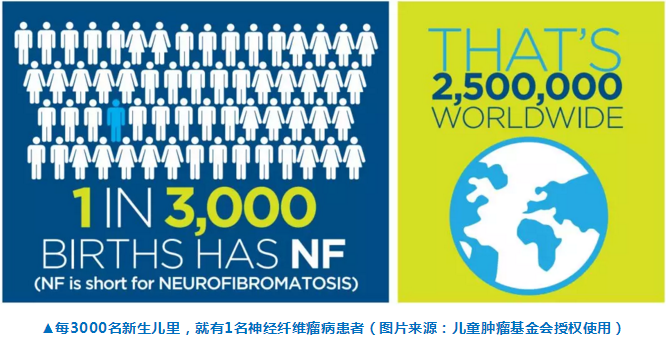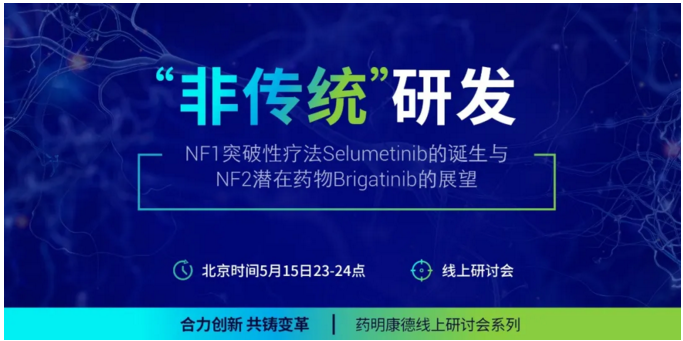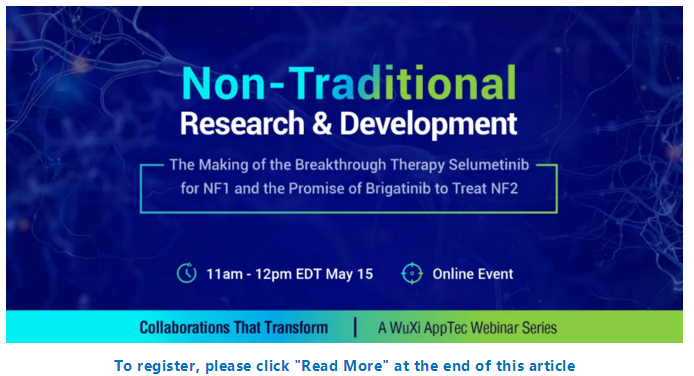一个月前,美国FDA宣布批准阿斯利康(AstraZeneca)公司和默沙东(MSD)公司共同开发的Koselugo(selumetinib)上市,治疗2岁及2岁以上的1型神经纤维瘤病(NF1)儿童患者。对于全球数百万神经纤维瘤病患者而言,这是历史性的一刻——终于,他们有了一款可以治疗其疾病的药物。更难得的是,这款药物的诞生,依赖多方的共同主动参与,有着非常“不走寻常路”的研发模式。对于正在开发的罕见病新药,乃至其他常见病的新药,这些宝贵的一线研发经验都有其可借鉴之处。

今年5月,恰逢世界神经纤维瘤病关爱月。值此之际,药明康德将在本月举办大型系列全球主题公益活动,聚焦神经纤维瘤病的临床诊疗进展和技术研发趋势,共同探讨如何应对NF医学难题,解决NF群体未被满足的医疗需求。相信这将提供独特的视角分享与思想碰撞的机遇。依药明康德所举办的全球论坛、健康产业论坛、以及抗疫系列线上论坛之惯例,本系列活动不收取任何参加费用。我们坚信,只有所有人都参与进来,携手并进,才能加速带来更多新药,造福病患。
北京时间2020年5月15日晚上11-12点(美国东部时间5月15日上午11-12点),我们将举办系列活动的第一场线上论坛,以首款神经纤维瘤病新药背后,那些值得所有人借鉴的“非传统”研发方式为引子,正式开启我们这一系列公益活动。如因时间原因,您无法观看直播,也可以通过注册,在活动结束后获得观看视频回放的机会。

本次线上论坛的嘉宾阵容强大,且都是罕见病药物研发领域的专家,在“非传统”研发上有着很深洞见。他们包括:
Brigitte Widemann,美国国立癌症研究所(National Cancer Institute)儿科肿瘤学科首席负责人。支持这款新药获批的临床试验(NCT01362803),便是由该研究所主要赞助支持的。
Scott Plotkin,哈佛医学院神经学教授,麻省总医院Pappas神经肿瘤中心执行董事。他是参与该临床试验的负责科学家之一,提供了宝贵的指南和建议。此外,他也正在参与brigatinib的临床试验,这是一款有望治疗2型神经纤维瘤病(NF2)的药物。
Annette Bakker,儿童肿瘤基金会主席。这是一家专注NF的患者非营利患者组织,旨在推进研究,拓展知识,改善对NF患者群体的护理。该组织的目标是终结NF。
George Kirk,阿斯利康肿瘤研发部,Koselugo全球产品负责人。他的团队与默沙东一道,推动了这款NF1新药的问世。
Mike Humphries,武田肿瘤部,美国区肺癌科学主任。武田公司的brigatinib是一款ALK抑制剂,目前已获批治疗非小细胞肺癌。目前,科学家们正在评估其治疗NF2的潜力。
主持:Richard Soll,药明康德波士顿办公室负责人和战略计划高级顾问。
点击文末“阅读原文/Read More”,即可免费注册报名。关于5月聚焦神经纤维瘤病的更多系列活动,请关注药明康德微信号,留意近期的活动预告。
药明康德致力于降低新药研发门槛,使更多医药企业、科研机构、医院医生以及患者群体受益。未来,我们将致力于加速将更多治疗罕见病的好药、新药带给全球病患。我们坚信,让“罕见病”不“罕治”,才是未来应该有的样子。我们期待您的参与,希冀您的深知灼见!
Collaborations that Transform: Non-Traditional R&D for Rare Diseases NF1 and NF2
8AM - 9AM PDT | 11AM - 12PM EDT | 5PM - 6PM CET | 11PM - 12AM Beijing Time
Friday, May 15 | Online Event
WuXi AppTec is pleased to unveil its new webinar series, “Collaborations That Transform”, which will highlight the impact of collaboration within the biotechnology industry to bring meaningful and effective therapies to patients. This series builds on and complements our ongoing interview series “Innovation That Matters”. As an enabler in the biotech and medical device industry, WuXi AppTec shares our common conviction that we must work collaboratively to solve industry-wide problems and bring transformational medicines to patients.
In honor of World Neurofibromatosis (NF) Awareness Month this May, we are delighted to kick off this seires with a panel discussion about the rare diseases neurofibromatosis type 1 (NF1) and neurofibromatosis type 2 (NF2). Selumetinib, a MEK inhibitor from AstraZeneca and Merck, was approved by the U.S. Food and Drug Administration on April 13, 2020, as the first drug to treat children with plexiform neurofibromas, a condition commonly found in patients with NF1. Brigatinib, a drug approved for the treatment of anaplastic lymphoma kinase (ALK) positive non-small cell lung carcinoma, is under clinical evaluation for the treatment of NF2 through a mechanism that is distinct from ALK activity. In both cases, these drugs were discovered through collaborative, non-traditional conduits. Their discovery and development have much to tell us about the life-changing potential that innovative and creative collaboration holds.
Non-Traditional Research & Development: The Making of the Breakthrough Therapy Selumetinib for NF1 and the Promise of Brigatinib to Treat NF2

Guest Panelists:
Brigitte Widemann, Chief, Pediatric Oncology Branch, NCI, NIH; Head, Pharmacology and Experimental Therapeutics Section
Scott Plotkin, Neuro-Oncologist; Executive Director, Pappas Center for Neuro-Oncology, Massachusetts General Hospital; Professor of Neurology, Harvard Medical School
Annette Bakker, President, Children’s Tumor Foundation
George Kirk, Koselugo Global Product Lead, AstraZeneca R&D, Oncology
Mike Humphries, US Scientific Director, Lung Cancer at Takeda Oncology
Moderated by Richard Soll, Head of Boston Office and Senior Advisor of Strategic Initiatives, WuXi AppTec